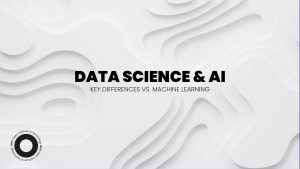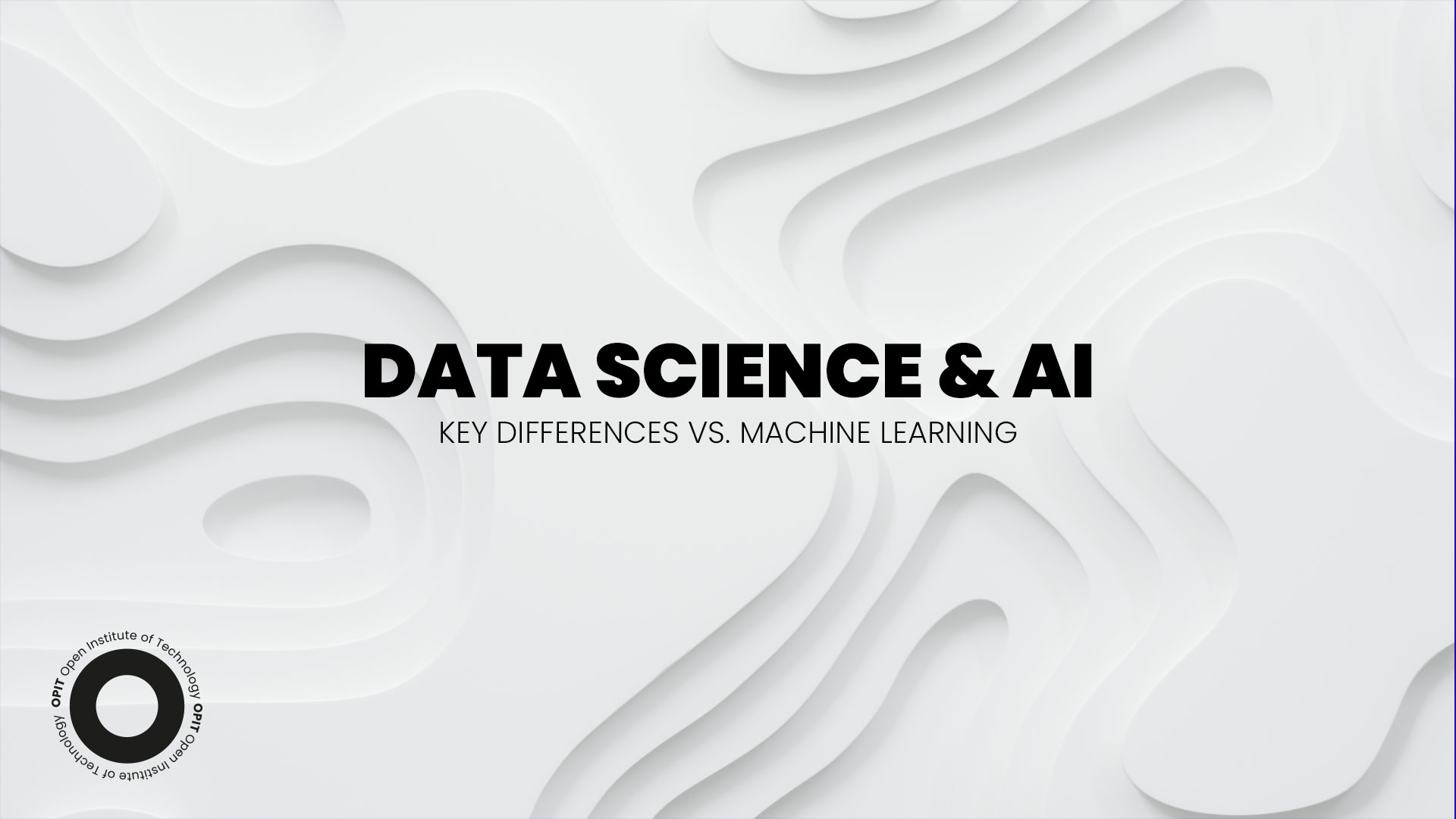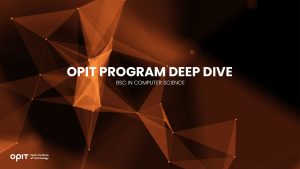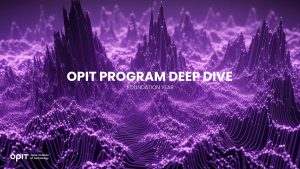

Machine learning, data science, and artificial intelligence are common terms in modern technology. These terms are often used interchangeably but incorrectly, which is understandable.
After all, hundreds of millions of people use the advantages of digital technologies. Yet only a small percentage of those users are experts in the field.
AI, data science, and machine learning represent valuable assets that can be used to great advantage in various industries. However, to use these tools properly, you need to understand what they are. Furthermore, knowing the difference between data science and machine learning, as well as how AI differs from both, can dispel the common misconceptions about these technologies.
Read on to gain a better understanding of the three crucial tech concepts.
Data Science
Data science can be viewed as the foundation of many modern technological solutions. It’s also the stage from which existing solutions can progress and evolve. Let’s define data science in more detail.
Definition and Explanation of Data Science
A scientific discipline with practical applications, data science represents a field of study dedicated to the development of data systems. If this definition sounds too broad, that’s because data science is a broad field by its nature.
Data structure is the primary concern of data science. To produce clean data and conduct analysis, scientists use a range of methods and tools, from manual to automated solutions.
Data science has another crucial task: defining problems that previously didn’t exist or slipped by unnoticed. Through this activity, data scientists can help predict unforeseen issues, improve existing digital tools, and promote the development of new ones.
Key Components of Data Science
Breaking down data science into key components, we get to three essential factors:
- Data collection
- Data analysis
- Predictive modeling
Data collection is pretty much what it sounds like – gathering of data. This aspect of data science also includes preprocessing, which is essentially preparation of raw data for further processing.
During data analysis, data scientists draw conclusions based on the gathered data. They search the data for patterns and potential flaws. The scientists do this to determine weak points and system deficiencies. In data visualization, scientists aim to communicate the conclusions of their investigation through graphics, charts, bullet points, and maps.
Finally, predictive modeling represents one of the ultimate uses of the analyzed data. Here, create models that can help them predict future trends. This component also illustrates the differentiation between data science vs. machine learning. Machine learning is often used in predictive modeling as a tool within the broader field of data science.
Applications and Use Cases of Data Science
Data science finds uses in marketing, banking, finance, logistics, HR, and trading, to name a few. Financial institutions and businesses take advantage of data science to assess and manage risks. The powerful assistance of data science often helps these organizations gain the upper hand in the market.
In marketing, data science can provide valuable information about customers, help marketing departments organize, and launch effective targeted campaigns. When it comes to human resources, extensive data gathering, and analysis allow HR departments to single out the best available talent and create accurate employee performance projections.
Artificial Intelligence (AI)
The term “artificial intelligence” has been somewhat warped by popular culture. Despite the varying interpretations, AI is a concrete technology with a clear definition and purpose, as well as numerous applications.
Definition and Explanation of AI
Artificial intelligence is sometimes called machine intelligence. In its essence, AI represents a machine simulation of human learning and decision-making processes.
AI gives machines the function of empirical learning, i.e., using experiences and observations to gain new knowledge. However, machines can’t acquire new experiences independently. They need to be fed relevant data for the AI process to work.
Furthermore, AI must be able to self-correct so that it can act as an active participant in improving its abilities.
Obviously, AI represents a rather complex technology. We’ll explain its key components in the following section.
Key Components of AI
A branch of computer science, AI includes several components that are either subsets of one another or work in tandem. These are machine learning, deep learning, natural language processing (NLP), computer vision, and robotics.
It’s no coincidence that machine learning popped up at the top spot here. It’s a crucial aspect of AI that does precisely what the name says: enables machines to learn.
We’ll discuss machine learning in a separate section.
Deep learning relates to machine learning. Its aim is essentially to simulate the human brain. To that end, the technology utilizes neural networks alongside complex algorithm structures that allow the machine to make independent decisions.
Natural language processing (NLP) allows machines to comprehend language similarly to humans. Language processing and understanding are the primary tasks of this AI branch.
Somewhat similar to NLP, computer vision allows machines to process visual input and extract useful data from it. And just as NLP enables a computer to understand language, computer vision facilitates a meaningful interpretation of visual information.
Finally, robotics are AI-controlled machines that can replace humans in dangerous or extremely complex tasks. As a branch of AI, robotics differs from robotic engineering, which focuses on the mechanical aspects of building machines.
Applications and Use Cases of AI
The variety of AI components makes the technology suitable for a wide range of applications. Machine and deep learning are extremely useful in data gathering. NLP has seen a massive uptick in popularity lately, especially with tools like ChatGPT and similar chatbots. And robotics has been around for decades, finding use in various industries and services, in addition to military and space applications.
Machine Learning
Machine learning is an AI branch that’s frequently used in data science. Defining what this aspect of AI does will largely clarify its relationship to data science and artificial intelligence.
Definition and Explanation of Machine Learning
Machine learning utilizes advanced algorithms to detect data patterns and interpret their meaning. The most important facets of machine learning include handling various data types, scalability, and high-level automation.
Like AI in general, machine learning also has a level of complexity to it, consisting of several key components.
Key Components of Machine Learning
The main aspects of machine learning are supervised, unsupervised, and reinforcement learning.
Supervised learning trains algorithms for data classification using labeled datasets. Simply put, the data is first labeled and then fed into the machine.
Unsupervised learning relies on algorithms that can make sense of unlabeled datasets. In other words, external intervention isn’t necessary here – the machine can analyze data patterns on its own.
Finally, reinforcement learning is the level of machine learning where the AI can learn to respond to input in an optimal way. The machine learns correct behavior through observation and environmental interactions without human assistance.
Applications and Use Cases of Machine Learning
As mentioned, machine learning is particularly useful in data science. The technology makes processing large volumes of data much easier while producing more accurate results. Supervised and particularly unsupervised learning are especially helpful here.
Reinforcement learning is most efficient in uncertain or unpredictable environments. It finds use in robotics, autonomous driving, and all situations where it’s impossible to pre-program machines with sufficient accuracy.
Perhaps most famously, reinforcement learning is behind AlphaGo, an AI program developed for the Go board game. The game is notorious for its complexity, having about 250 possible moves on each of 150 turns, which is how long a typical game lasts.
Alpha Go managed to defeat the human Go champion by getting better at the game through numerous previous matches.
Key Differences Between Data Science, AI, and Machine Learning
The differences between machine learning, data science, and artificial intelligence are evident in the scope, objectives, techniques, required skill sets, and application.
As a subset of AI and a frequent tool in data science, machine learning has a more closely defined scope. It’s structured differently to data science and artificial intelligence, both massive fields of study with far-reaching objectives.
The objectives of data science are pto gather and analyze data. Machine learning and AI can take that data and utilize it for problem-solving, decision-making, and to simulate the most complex traits of the human brain.
Machine learning has the ultimate goal of achieving high accuracy in pattern comprehension. On the other hand, the main task of AI in general is to ensure success, particularly in emulating specific facets of human behavior.
All three require specific skill sets. In the case of data science vs. machine learning, the sets don’t match. The former requires knowledge of SQL, ETL, and domains, while the latter calls for Python, math, and data-wrangling expertise.
Naturally, machine learning will have overlapping skill sets with AI, since it’s its subset.
Finally, in the application field, data science produces valuable data-driven insights, AI is largely used in virtual assistants, while machine learning powers search engine algorithms.
How Data Science, AI, and Machine Learning Complement Each Other
Data science helps AI and machine learning by providing accurate, valuable data. Machine learning is critical in processing data and functions as a primary component of AI. And artificial intelligence provides novel solutions on all fronts, allowing for more efficient automation and optimal processes.
Through the interaction of data science, AI, and machine learning, all three branches can develop further, bringing improvement to all related industries.
Understanding the Technology of the Future
Understanding the differences and common uses of data science, AI, and machine learning is essential for professionals in the field. However, it can also be valuable for businesses looking to leverage modern and future technologies.
As all three facets of modern tech develop, it will be important to keep an eye on emerging trends and watch for future developments.
Related posts

Computer Science is fast becoming one of the most valuable fields of study, with high levels of demand and high-salaried career opportunities for successful graduates. If you’re looking for a flexible and rewarding way to hone your computing skills as part of a supportive global community, the BSc in Computer Science at the Open Institute of Technology (OPIT) could be the perfect next step.
Introducing the OPIT BSc in Computer Science
The OPIT BSc in Computer Science is a bachelor’s degree program that provides students with a comprehensive level of both theoretical and practical knowledge of all core areas of computer science. That includes the likes of programming, databases, cloud computing, software development, and artificial intelligence.
Like other programs at OPIT, the Computer Science BSc is delivered exclusively online, with a mixture of recorded and live content for students to engage with. Participants will enjoy the instruction of world-leading lecturers and professors from various fields, including software engineers at major tech brands and esteemed researchers, and will have many paths open to them upon graduation.
Graduates may, for example, seek to push on with their educational journeys, progressing on to a specialized master’s degree at OPIT, like the MSc in Digital Business and Innovation or the MSc in Responsible Artificial Intelligence. Or they could enter the working world in roles like software engineer, data scientist, web developer, app developer, or cybersecurity consultant.
The bullets below outline the key characteristics of this particular course:
- Duration: Three years in total, spread across six terms.
- Content: Core courses for the first four terms, a student-selected specialization for the fifth term, and a capstone project in the final term.
- Focus: Developing detailed theoretical knowledge and practical skills across all core areas of modern computer science.
- Format: Entirely online, with a mixture of live lessons and asynchronous content you can access 24/7 to learn at your own pace.
- Assessment: Progressive assessments over the course of the program, along with a capstone project and dissertation, but no final exams.
What You’ll Learn
Students enrolled in the BSc in Computer Science course at OPIT will enjoy comprehensive instruction in the increasingly diverse sectors that fall under the umbrella of computer science today. That includes a close look at emerging technologies, like AI and machine learning, as well as introductions to the fundamental skills involved in designing and developing pieces of software.
The first four terms are the same for all students. These will include introductions to software engineering, computer security, and cloud computing infrastructure, as well as courses focusing on the core skills that computer scientists invariably need in their careers, like project management, quality assurance, and technical English.
For the fifth term, students will have a choice. They can select five electives from a pool of 27, or select one field to specialize in from a group of five. You may choose to specialize in all things cybersecurity, for example, and learn about emerging cyber threats. Or you could focus more on specific elements of computer science that appeal to your interests and passions, such as game development.
Who It’s For
The BSc in Computer Science program can suit a whole range of prospective applicants and should appeal to anyone with an interest or passion for computing and a desire to pursue a professional career in this field. Whether you’re seeking to enter the world of software development, user experience design, data science, or another related sector, this is the course to consider.
In addition, thanks to OPIT’s engaging, flexible, and exclusively online teaching and learning systems, this course can appeal to people from all over the globe, of different ages, and from different walks of life. It’s equally suitable for recent high school graduates with dreams of making their own apps to seasoned professionals looking to broaden their knowledge or transition to a different career.
The Value of the BSc in Computer Science Course at OPIT
Plenty of universities and higher education establishments around the world offer degrees in computer science, but OPIT’s program stands out for several distinctive reasons.
Firstly, as previously touched upon, all OPIT courses are delivered online. Students have a schedule of live lessons to attend, but can also access recorded content and digital learning resources as and when they choose. This offers an unparalleled level of freedom and flexibility compared to more conventional educational institutions, putting students in the driving seat and letting them learn at their own pace.
OPIT also aims not merely to impart knowledge through lectures and teaching, but to actually help students gain the practical skills they need to take the next logical steps in their education or career. In other words, studying at OPIT isn’t simply about memorizing facts and paragraphs of text; it’s about learning how to apply the knowledge you gain in real-world settings.
OPIT students also enjoy the unique benefits of a global community of like-minded students and world-leading professors. Here, distance is no barrier, and while students and teachers may come from completely different corners of the globe, all are made to feel welcome and heard. Students can reach out to their lecturers when they feel the need for guidance, answers, and advice.
Other benefits of studying with OPIT include:
- Networking opportunities and events, like career fairs, where you can meet and speak with representatives from some of the world’s biggest tech brands
- Consistent support systems from start to finish of your educational journey in the form of mentorships and more
- Helpful tools to expedite your education, like the OPIT AI Copilot, which provides personalized study support
Entry Requirements and Fees
To enroll in the OPIT BSc in Computer Science and take your next steps towards a thrilling and fulfilling career in this field, you’ll need to meet some simple criteria. Unlike other educational institutions, which can impose strict and seemingly unattainable requirements on their applicants, OPIT aims to make tech education more accessible. As a result, aspiring students will require:
- A higher secondary school leaving certificate at EQF Level 4, or equivalent
- B2-level English proficiency, or higher
Naturally, applicants should also have a passion for computer science and a willingness to study, learn, and make the most of the resources, community, and support systems provided by the institute.
In addition, if you happen to have relevant work experience or educational achievements, you may be able to use these to skip certain modules or even entire terms and obtain your degree sooner. OPIT offers a comprehensive credit transfer program, which you can learn more about during the application process.
Regarding fees, OPIT also stands out from the crowd compared to conventional educational institutions, offering affordable rates to make higher tech education more accessible. There are early bird discounts, scholarship opportunities, and even the option to pay either on a term-by-term basis or a one-off up-front fee.

The Open Institute of Technology (OPIT) provides a curated collection of courses for students at every stage of their learning journey, including those who are just starting. For aspiring tech leaders and those who don’t quite feel ready to dive directly into a bachelor’s degree, there’s the OPIT Foundation Program. It’s the perfect starting point to gain core skills, boost confidence, and build a solid base for success.
Introducing the OPIT Foundation Year Program
As the name implies, OPIT’s Foundation Program is about foundation-level knowledge and skills. It’s the only pre-bachelor program in the OPIT lineup, and successful students on this 60-ECTS credit course will obtain a Pre-Tertiary Certificate in Information Technology upon its completion. From there, they can move on to higher levels of learning, like a Bachelor’s in Digital Business or Modern Computer Science.
In other words, the Foundation Program provides a gentle welcome into the world of higher technological education, while also serving as a springboard to help students achieve their long-term goals. By mixing both guided learning and independent study, it also prepares students for the EQF Level 4 experiences and challenges they’ll face once they enroll in a bachelor’s program in IT or a related field.
Here’s a quick breakdown of what the OPIT Foundation Program course involves:
- Duration: Six months, split into two terms, with each term lasting 13 weeks
- Content: Three courses per term, with each one worth 10 ECTS credits, for a total of 60
- Focus: Core skills, like mathematics, English, and introductory-level computing
- Format: Video lectures, independent learning, live sessions, and digital resources (e-books, etc.)
- Assessment: Two to three assessments over the course of the program
What You’ll Learn
The OPIT Foundation Program doesn’t intensely focus on any one particular topic, nor does it thrust onto you the more advanced, complicated aspects of technological education you would find in a bachelor’s or master’s program. Instead, it largely keeps things simple, focusing on the basic building blocks of knowledge and core skills so that students feel comfortable taking the next steps in their studies.
It includes the following courses, spread out across two terms:
- Academic Skills
- Mathematics Literacy I
- Mathematics Literacy II
- Internet and Digital Technology
- Academic Reading, Writing, and Communication
- Introduction to Computer Hardware and Software
Encompassing foundational-level lessons in digital business, computer science, and computer literacy, the Foundation Program produces graduates with a commanding knowledge of common operating systems. Exploring reading and writing, it also helps students master the art of communicating their ideas and responses in clear, academic English.
Who It’s For
The Foundation Year program is for people who are eager to enter the world of technology and eventually pursue a bachelor’s or higher level of education in this field, but feel they need more preparation. It’s for the people who want to work on their core skills and knowledge before progressing to more advanced topics, so that they don’t feel lost or left behind later on.
It can appeal to anyone with a high school-level education and ambitions of pushing themselves further, and to anyone who wants to work in fields like computer science, digital business, and artificial intelligence (AI). You don’t need extensive experience or qualifications to get started (more on that below); just a passion for tech and the motivation to learn.
The Value of the Foundation Program
With technology playing an increasingly integral role in the world today, millions of students want to develop their tech knowledge and skills. The problem is that technology-oriented degree courses can sometimes feel a little too complex or even inaccessible, especially for those who may not have had the most conventional educational journeys in the past.
While so many colleges and universities around the world simply expect students to show up with the relevant skills and knowledge to dive right into degree programs, OPIT understands that some students need a helping hand. That’s where the Foundation Program comes in – it’s the kind of course you won’t find at a typical university, aimed at bridging the gap between high school and higher education.
By progressing through the Foundation Program, students gain not just knowledge, but confidence. The entire course is aimed at eliminating uncertainty and unease. It imbues students with the skills and understanding they need to push onward, to believe in themselves, and to get more value from wherever their education takes them next.
On its own, this course won’t necessarily provide the qualifications you need to move straight into the job market, but it’s a vital stepping stone towards a degree. It also provides numerous other advantages that are unique to the OPIT community:
- Online Learning: Enjoy the benefits of being able to learn at your own pace, from the comfort of home, without the costs and inconveniences associated with relocation, commuting, and so on.
- Strong Support System: OPIT professors regularly check in with students and are on hand around the clock to answer queries and provide guidance.
- Academic Leaders: The OPIT faculty is made up of some of the world’s sharpest minds, including tech company heads, experienced researchers, and even former education ministers.
Entry Requirements and Fees
Unlike OPIT’s other, more advanced courses, the Foundation Program is aimed at beginners, so it does not have particularly strict or complex entry requirements. It’s designed to be as accessible as possible, so that almost anyone can acquire the skills they need to pursue education and a career in technology. The main thing you’ll need is a desire to learn and improve your skills, but applicants should also possess:
- English proficiency at level B2 or higher
- A Secondary School Leaving Certificate, or equivalent
Regarding the fees, OPIT strives to lower the financial barrier of education that can be such a deterrent in conventional education around the world. The institute’s tuition fees are fairly and competitively priced, all-inclusive (without any hidden charges to worry about), and accessible for those working with different budgets.
Given that all resources and instruction are provided online, you can also save a lot of money on relocation and living costs when you study with OPIT. In addition, applicants have the option to pay either up front, with a 10% discount on the total, or on a per-term basis, allowing you to stretch the cost out over a longer period to ease the financial burden.
Have questions?
Visit our FAQ page or get in touch with us!
Write us at +39 335 576 0263
Get in touch at hello@opit.com
Talk to one of our Study Advisors
We are international
We can speak in:


